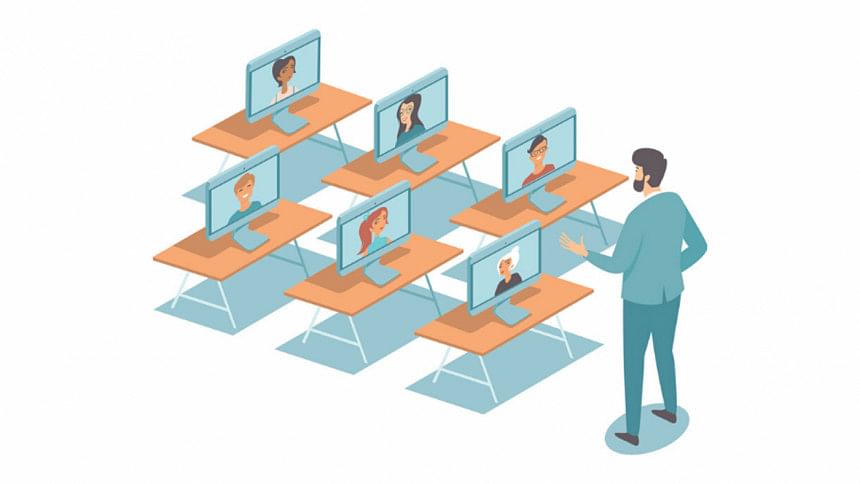Pandemic Pedagogy

The Covid-19 pandemic has altered all of our professional beliefs and behaviours. I used to believe, for example, that teaching is a flesh-and-blood experience and that human interaction is essential to education. When I shifted to online teaching in March this year, my teaching was reduced to speaking to a screen. I assume that my students exist. My students assume that I exist. We assume all together that the university exists. Beyond assumption nothing seems to exist besides disruptions and depression. Every time I get down to teaching online under such circumstances, an existential threat overcomes me.
The pandemic confirmed what I already believed—teachers are professional pariahs. We claim smugly that teaching creates all other professions. That's a delusion! As governments worldwide ease or lift lockdown, they resume "essential services". Teaching is not deemed an essential service, so educational institutions operate virtually while everything else has started operating physically. This implies that education operates under a political, economic, and somatic cushion. Education is not considered critical to retaining and sustaining stability when politics, economy, and safety falter or fail. Education is at once a burden and a luxury without any redeeming potential. No one seems to need an education for ethical, empirical and enlightened engagement with reality. Investment in education is optional these days to maintain the status quo. Education solves no problem, because education is a problem. Teachers have created and compounded that problem, sceptics speculate. So, what do we need teaching for?
That question becomes seriouse when we fail to show the connection between the courses we teach and the future our students want to forge as an outcome of education. The coronavirus has already devoured our future. We're in an unprecedented chaos. The whole world has become a hygiene theatre, where almost everyone is a potential virus bomb waiting to explode. As such, no one commits to enlightenment for himself and others—everyone waits for a vaccine. We're hurled into an uncomfortable, eternal present. With every passing moment, reality shifts. Education prepares us for reflection and research, for informed engagement as reality unfolds as we expect it to. But ours is a surreal world, where reality is transgressive and transient. However we teach—whether technically synchronous or asynchronous—is anachronous. And whatever we teach falls between the cracks without connecting the present with the future. Such a situation impeaches teachers.
It is irrational to place teachers in a position where they are expected to dispense altruism wholesale. Teaching is not a charity. Teaching certainly embodies love, but that's tough love. When, however, the time is already tough, it doesn't behove a teacher to become tougher. The pandemic has displaced students along with making them financially vulnerable. For example, a recent survey by the Healthy Minds Network for Research on Adolescent and Young Adult Mental Health and the American College Health Association of 18,764 students from 14 campuses in the US reported that 60 percent of the students claim that the pandemic has caused them financial stress.
This finding in the US resonates with Bangladesh, too. A survey by the Bangladesh Economic Association reports that 66 million people have lost their jobs in the first 66 days since the closure was imposed nationwide in March. That may have depleted—even diminished—the sources of funding some students used to depend on to facilitate their studies. Additionally, some students have been flung so far away that they have limited and intermittent access to the Internet. Some students have neither a desktop nor a laptop computer. They only have a smartphone, which is not enough to participate actively in an online class. None of these problems are the students' fault. They are just the victims, whose performance and creativity are adversely affected. When these inconveniences of students factor into teaching—grading, in particular—teachers might prefer kindness over intellectual rigour. But there's an element of compromise in such an equation, however humane it is.
Financial crisis, displacement, and adjustment to the new format of teaching are psychologically consequential for students. Teachers can't help students deal with the psychological problems caused by the pandemic. Teachers are not counsellors. Teachers are meant to ensure students' intellectual well-being. Effective teaching presupposes mental stability, but the pandemic has severely disrupted students' mental health. For example, a survey co-led by the University of California, Berkeley, Center for the Study of Higher Education and the University of Minnesota, in which 46,071 students from nine different institutions from the US participated to answer questions on their mental health from May to July, reveals that 39 percent of students screened positive for anxiety disorder.
In Bangladesh, the situation is worse even under normal circumstances. A study by Md Saiful Islam and others conducted on 400 first year students from a public university published in March 2020, in the "International Journal of Mental Health and Addiction," found that about 70 percent of students suffer from severe to extreme levels of depression. Had they conducted the study during the pandemic, how much more would most of the students have been depressed? Depression management critically defines teaching during the pandemic. That worries and limits many teachers.
Given all these forces and factors that permeate the landscape of teaching during the pandemic, some teachers might suffer from what Steven Pinker dubs in The Sense of Style the "illusion of good old days". What people euphemistically call "online teaching", they would like to call "emergency distance teaching". They're not convinced that this is teaching at all, because coming together in real time and space is fundamental to teaching. Teaching is not about providing specific content knowledge only. Teaching is also about coming together to share ideas, to forge long-lasting connections, and to think critically through debates and discussions as to what it means and takes to be human. Thinking presupposes engagement and interaction. A university is the biggest and best site for real-time engagement and interaction. That's the university we had! Distance and disconnection invert the very definition of that university. In such an inverted university only zombies and cyborgs fit. And it's the only university that exists now. Some teachers are not comfortable in teaching at such a university, because it fundamentally compromises the content, rigour, and principles of teaching. I hate to break it to you but I also fit into that mould.
The pandemic has drained me as a teacher. I've scrambled to do things that I hardly had preparation and expertise for. I've also realised that the pandemic has stretched me as a teacher. The last several months have been pedagogically invigorating—as I have been pushed out of my comfort zone to search for and experiment with new approaches to teaching. As the pandemic still seems relentless, debates and discussions have been shifting away from on-site versus online teaching into how we can best serve our students under such circumstances. It seems that we need more of everything—resilience, compassion, and technological literacy—on top of our intellectual capital to teach during the pandemic. Most importantly, we need to refuse to be ceaselessly borne back into the past to mourn the loss of perfect teaching in a perfect world.
The world has always been messy, with or without the pandemic—teaching has been even messier, on-site or online. Let's admit that! Some teachers do consider the pandemic a blessing, to redefine teaching so as to make it more encompassing, pragmatic, and effective. I again have to break it to you that I'm one of those teachers.
If I sound paradoxical, well, aren't we indeed in a paradox? Our actions and reactions are at once rational and radical as we weather the pandemic. We've seen how an absurd phenomenon—that is, online teaching—has become at least temporarily inevitable. The pandemic has spawned a complex teaching scenario that simultaneously compromises and redefines teaching. Therefore, the question that I posed at the beginning of this pitch is a rhetorical one, that asks us all for more reflection than for resolution.
Mohammad Shamsuzzaman is an Assistant Professor, Department of English and Modern Languages, North South University, Bangladesh.
E-mail: [email protected]

 For all latest news, follow The Daily Star's Google News channel.
For all latest news, follow The Daily Star's Google News channel. 



Comments